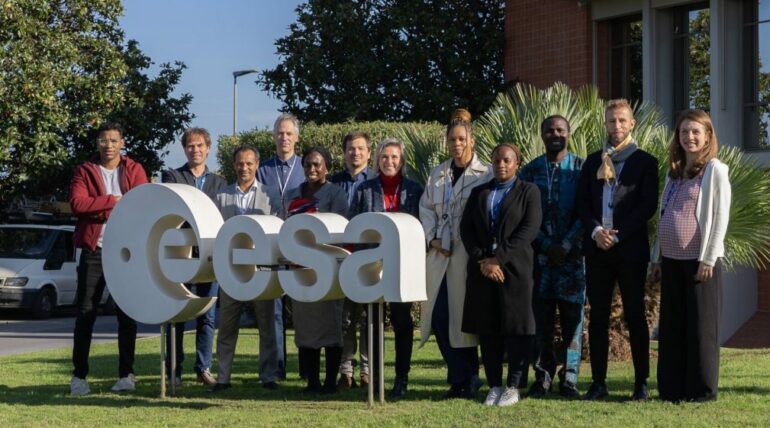
November 21, 2024
The African Research Fellows join ESA through the Earth Observation for African Framework for Research, Innovation, Communities and Applications Initiative (EO AFRICA), a program dedicated to advancing sustainable Earth Observation (EO) and space technology across Africa in collaboration with the African Union Commission. Through this unique opportunity, fellows are equipped to tackle Africa’s pressing food security and water management challenges by creating innovative, data-driven solutions. EO AFRICA is designed to address the continent’s specific needs, paving the way for a digitally connected future in Africa. With a long-term vision, this initiative—comprising a network of over 4,000 professionals collaborating with more than 100 entities across Africa—is shaping a new generation of African leaders in Earth Observation science and technology.
The photo features ESRIN’s director, Ms. Simonetta Cheli, alongside the current African Research Fellows: Mr. Odunayo David Adeniyi from Nigeria, Mr. Gebeyehu Abebe Zeleke from Ethiopia, Ms. Beatrice Asenso Barnieh from Ghana, and Mr. Abdelhakim Amazirh from Morocco. Also pictured are visiting fellows from South Africa, Ms. Thando Oliphant and Ms. Zintle Mbulawa, as well as the ESA EO AFRICA Team (Zoltan Szantoi, Giuseppe Ottavianelli, Francesca Leonelli, Benjamin Koetz, and Francesco Palazzo).
Since 2022, ESA’s annual call has recruited African Research Fellows through its EO AFRICA Initiative. Looking ahead, the 2024/2025 call, which closed in October, attracted a record-breaking 180 applications from 32 African countries for just four available spots, highlighting strong interest and engagement. ESA’s selection process is now underway to choose the next cohort of Fellows who will contribute to sustainable development solutions across the continent. Additionally, a special collaboration between the South African National Space Agency (SANSA) and ESA has made research fellowships available, with two fellows, Ms. Thando Oliphant and Ms. Zintle Mbulawa, currently hosted at ESRIN’s Phi-Lab.
Thando Oliphant, a Remote Sensing Technologist at the SANSA, holds an MSc in GIS and Remote Sensing from the University of the Witwatersrand. Thando’s research project focuses on solar energy potential and aims at identifying optimal locations for solar plant in South Africa through the integration of machine learning techniques, GIS, and multicriteria decision analysis. The goal of the project is to encourage the use of sustainable green energy solutions and contribute to South Africa’s green energy transition efforts.
Zintle Mbulawa, a Junior Remote Sensing Scientist at SANSA, holds a B.Sc. Honours in Computer Science from the University of Forthare and is deeply passionate about Artificial Intelligence. Zintle’s research project focuses on integrating Artificial intelligence and Remote Sensing techniques for crop health monitoring and yield prediction, specifically aimed at supporting subsistence farmers in South Africa. This project aims to enhance crop production, optimize resource allocation and contributes to food security in South Africa.
The EO AFRICA R&D Facility for capacity-building, community engagement and innovation support
Since 2021, EO AFRICA has launched several activities involving African authorities, institutions, and the private sector, addressing the research, applications, and operational needs identified by African stakeholders.
The ESA-funded EO AFRICA R&D Facility, active since March 2021, offers free capacity-building programs for Africans, such as webinars, MOOCs, and face-to-face training. It also supports ongoing R&D projects and strengthens the EO AFRICA community. Under the guidance of an African advisory board—comprising representatives from the African Union Commission, AARSE, NARSDA, and SANSA—the facility has supported over 30 tandem African-European R&D projects.
Researchers benefit from the Innovation Lab, a cloud platform that offers access to data, tools, open-source algorithms, and a customizable environment for developing EO applications. A third call for proposals is currently underway, with up to 10 new research teams expected to join. In addition, five African-led teams have been awarded grants to develop training materials.
ESA projects with African stakeholders
In parallel, ESA has initiated two Continental Demonstrator projects using high-resolution EO data from the Sentinels to (1) systematically monitor rangeland indicators and (2) integrate satellite data with in-situ and socio-economic data for agriculture.
In September 2022, 10 new projects were launched, involving African developers and early adopters. Among these are six Explorer projects, which focus on developing methods for water resource management and food security using data from NASA’s ECOSTRESS thermal sensor and ASI’s PRISMA hyperspectral sensor. Additionally, four National Incubator projects work with African experts to co-develop EO-based solutions for sustainable agriculture and drought monitoring at the national scale.
Coming together at the EO Africa Symposium to take stock of the cooperation to date
The EO Africa Symposium 2024, hosted at ESA’s ESRIN facility in Italy from September 23-26, brought together a diverse range of African and European organizations to explore the pivotal role of Earth Observation (EO) in addressing Africa’s environmental and developmental needs. Key topics included water and food security, urban growth, biodiversity conservation, and disaster resilience, underscoring EO’s significance in promoting sustainable development across Africa.
Global reach included participation from 28 African countries, 20 European countries, and 8 countries from the Americas, Middle East, and Asia. Attendance saw over 300 participants in person and 500 online each day.


